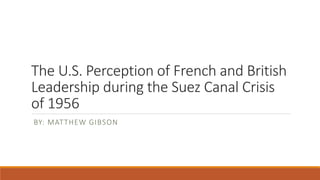
Suez Crisis 1956 Research Presentation MG
- 1. The U.S. Perception of French and British Leadership during the Suez Canal Crisis of 1956 BY: MATTHEW GIBSON
- 2. Historical Context On July 26, 1956, Egyptian President Gamal Abdel Nasser announced the nationalization of the Suez Canal Company, the joint British-French enterprise which had owned and operated the Suez Canal since its construction in 1869. Nasser’s announcement came about following months of mounting political tensions between Egypt, Britain, and France. Although Nasser offered full economic compensation for the Company, the British and French Governments, long suspicious of Nasser’s opposition to the continuation of their political influence in the region, were outraged by the nationalization. The Egyptian leader, in turn, resented what he saw as European efforts to perpetuate their colonial domination.
- 3. Topic That is Being Studied U.S. perception of French and British leadership in the Suez Crisis U.S., French, and British relations Three key points of emphasis ◦ Diplomatic relations ◦ Reputation of the French and British within the Middle East and Northern Africa ◦ Reputation of the U.S. in the Middle East
- 4. Other arguments about this topic Cogan, Charles G. “From the Politics of Lying to the Farce at Suez: What the Us Knew.” Intelligence & National Security 13, no. 2 (April 1998): 100–122. ◦ Main Argument: The intelligence that the U.S. had about the Crisis , led them to believe that the French and British were unreliable in diplomatic decisions, stubborn, and greedy. Fitzsimons, M. A. “The Suez Crisis and the Containment Policy.” The Review of Politics 19, no. 4 (October 1, 1957): 419–45. ◦ Main Argument: analyzes how the French and British invasion of Egypt did not have the same intentions as the U.S. containment policy, which leads the U.S. to disagree with both France and Britain in handling Nassir's Nationalization of the Suez Canal . Dietl, Ralph. “Suez 1956: A European Intervention?” Journal of Contemporary History 43, no. 2 (April 1, 2008): 259–78. ◦ Main Argument: Europe wants to become a third force in the cold war
- 5. Structure of My Paper Historical context Establishing a thesis ◦ The U.S. perceived the French and British leadership role in the Suez Crisis as deceitful, diplomatically aggressive and demanding, and greedy. Talk about each of my claims and show how they connect to the bigger picture: Colonialism had no place in a containment policy Demonstrate how my argument is different Show how my argument fits within historiography of the cold war
- 6. Basic Arguments and Significant Questions Arguments ◦ The U.S. did not want to see any other country in a leadership role during the cold war ◦ Friction between the Western Powers: Colonialism
- 7. New Approach to the Suez Crisis Moves outside the contextualization of the Suez Crisis within the Cold War Specifically examines relations between the U.S., France, and Britain Answers the question of why the U.S. condemned the French and British approach to the Suez Crisis
- 8. Secondary Sources Bernard, Jean-Yves. “Disregarding the Atlantic ‘Special Relationship’: The Eden Cabinet in the Lead-up to the Invasion of the Suez Canal Zone.” Canadian Journal of History 44, no. 1 (Spring/Summer ///Spring/Summer2009 2009): 39. Cogan, Charles G. “From the Politics of Lying to the Farce at Suez: What the Us Knew.” Intelligence & National Security 13, no. 2 (April 1998): 100–122. Filipink, Richard M. “‘Force Is the Last Method’: Eisenhower, Dulles and American Intervention in the Suez Crisis.” Critique: Journal of Socialist Theory 35, no. 2 (August 2007): 173–88. doi:10.1080/03017600701446165. Fitzsimons, M. A. “The Suez Crisis and the Containment Policy.” The Review of Politics 19, no. 4 (October 1, 1957): 419–45. Grosser (A.). “Suez, Hungary and European Integration.” International Organization, 11, no. 3 (January 1, 1957): 470–80. Hahn, Peter L. Review of Review of Eisenhower and the Suez Crisis of 1956, by Cole C. Kingseed. The American Historical Review 102, no. 2 (1997): 577–78. doi:10.2307/2171034. Jones, Matthew. “Anglo-American Relations after Suez, the Rise and Decline of the Working Group Experiment, and the French Challenge to NATO, 1957-59.” Diplomacy & Statecraft 14, no. 1 (March 2003): 49–79. Kunz, Diane B. The Economic Diplomacy of the Suez Crisis. University of North Carolina Press, 2000. http://www.jstor.org/stable/10.5149/9780807862698_kunz. Lahav, Pnina. “The Suez Crisis of 1956 and Its Aftermath: A Comparative Study of Constitutions, Use of Force, Diplomacy and International Relations.” Boston University Law Review 95, no. 4 (July 2015): 1297–1354. Richardson, Louise. “Avoiding and Incurring Losses: Decision-Making in the Suez Crisis.” International Journal 47, no. 2 (April 1, 1992): 370–401. doi:10.2307/40202764. Suez Crisis : American Policy and the Effect on NATO. [Place of publication not identified] : [publisher not identified], 1967., 1967.
- 9. Primary Sources Aldrich, Winthrop W., “The Suez Crisis: A Footnote to History,” Foreign Affairs, April 1967, pp. 541-552. Copeland, Miles. The Game of Nations: The Amorality of Power Politics (London: Wiedenfeld & Nicolson, 1969). Department of State Bulletin, 1956, Vols. XXXIV and XXXV (Washington: U.S. Government Printing Office, 1956-1957). Eisenhower, Dwight D. The White House Years. Waging Peace, 1956-1961 (Garden City, N.Y.: Doubleday and Company, 1965). Joint Hearings before Subcommittees of the Committee on the Judiciary and the Committee on interior and Insular Affairs, United States Senate, Eight-fifth Congress, First Session, Parts 1-4 (Washington: U.S. Government Printing office, 1956). The Suez Canal Problem, July 26-September 22, 1956 (Washington: U.S. Government Printing Office, 1956). U.S. Congress. Senate. Executive Sessions of the Senate Foreign Relations Committee (Historical Series), Vol. VIII, Eighty-fourth Congress, Second Session, 1956 (Washington: U.S. Government Printing Office, 1978). U.S. Department of State. American Foreign Policy: Current Documents, 1956 (Washington:U.S. Government Printing Office, 1959). U.S. National Archives and Records Administration. Public Papers of the Presidents of the United States: Dwight D. Eisenhower, 1956 (Washington: U.S. Government Printing Office, 1958). United States Policy in the Middle East, September 1956-June 1957 (Washington: U.S.Government Printing Office, 1956).